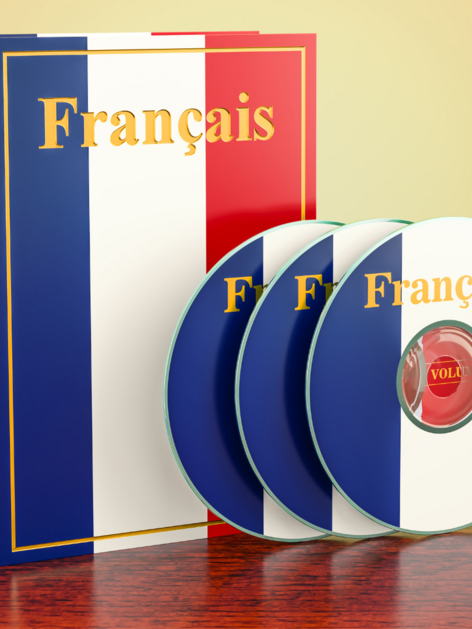Months and Seasons in French: Translation and Pronunciation
Months in French: How to Write Them and their Translation
As both Romance languages, French and Italian often share vocabulary and etymology. There are many similar words whose meaning and translation, even if we've never heard them before, are easily identifiable. This is also true for the months in French. Here they are, along with their respective Italian translations:
- janvier = January
- février = February
- mars = March
- avril = April
- never = may
- juin = June
- juillet = July
- ao û t = August
- septembre = September
- octobre = October
- November = November
- December
Nothing complicated, as you can see; in fact, the word "November" is identical to the Italian one. Unlike the English month, in French it's not necessary to capitalize the month unless it comes at the beginning of the sentence, after a full stop. Let's look at some usage examples:
Août est mon mois préféré. = August is my favorite month.
Le mois d' août est mon mois favori. = The month of August is my favorite.
Avril est enfin arrivé. = April has finally arrived .
Another important issue to clarify concerns the prepositions of time to be used with the months of the year in French. In this case, the only correct option is the simple preposition EN , which we translate as "a" or "in" depending on the context.
Examples :
Maintenant is late, on and will think in September . = Now it's late, we'll think about it in September .
Le printemps débute en mars . = Spring begins in March .
En juin , le soleil chauffe déjà en ville. = In June , the sun is already warming the city.
Even when we refer to a specific month, we continue to use the preposition en ; what changes is the translation into Italian.
Example:
Nous nous sommes fiancés en février 2013 . = We got engaged in February 2017.
When we want to mean a period of time from one month to the next, we use the preposition combo de + à:
Examples:
The school opens from September to June . = The school is open from September to June .
We are leaving on holidays from Mars to ever . = We will go on holiday from March to May .
In any case, it is important to remember that the months of the year in French are all masculine .
Months in French: Correct Pronunciation
And now let's move on to what, for many, represents the real difficulty of the French language: pronunciation. It's true that there are sounds very different from our own and that reproducing them isn't so easy, but with the help of phonetics, you'll see that getting the hang of it isn't as difficult as you think. Here's how to pronounce the months in French:
- "Janvier" = "ʒɑ̃.vje," where the ʒ sound is the classic French dragged "g," which we also hear in the word "Jacques." The vowel ɑ̃ is pronounced with the mouth full, almost like an "o," while the "n" is barely audible and is a full nasal sound. As often happens in French words ending in "-er," the "r" is silent and the accent falls on the vowel. → gianvié
- Février = fevʁije, which, similarly to what happened before becomes something like → fevrié
- Mars = maʁs , very simple; the final "s" disappears and the "r" is the classic French → mar
- Avril = avʁil . Nothing particularly complicated here either, just remember to curl the "r" and place the accent on the "i," which is slightly lengthened. → avrìl
- Mai = mɛ. Short and very simple sound, with the closed "e" of our "perché" → mé
- Juin = ʒɥɛ̃. . Although it may seem like an unfamiliar language, there's nothing too complex about Juin either. The only difficulty comes from the "i," which is pronounced like a cross between an "e" and an "a," and then merges with the nasal sound of the final "n." → giuàn
- Juillet = ʒɥijɛ. The same goes for Juillet, but with the peculiarity of the double "L." In French, it's usually pronounced the same as in Italian, except when preceded by an "i," which then sounds similar to "gl," a bit like the double "L" in Spanish. In the case of Juillet, therefore, we'd read something like → giuiglié
- Août = ut . It couldn't be simpler! → ùt
- Septembre = sɛptɑ̃bʁ. Here, just remember that the "e" is pronounced like a full "a" (when phonetically written "ɑ̃" like this, you should always imagine it as an "a" pronounced deep in the throat) and that the final "e" is silent. → septambr
- Octobre = ɔktɔbʁ. The same goes for octobre and all French months ending in -bre. → octòbr
- November = nɔvɑ̃bʁ → novambr
- Décembre = desɑ̃bʁ → Just a little attention to the overcorrectiveness here : we're not in English; that "é" is still an "e"! → desambr
Seasons in French: How to Write and Translate Them


Let's now move on to the Seasons in French , another very interesting and useful topic to learn. And, luckily for us, it's also very simple: as you might imagine, it's just four simple words you can learn by heart once and use when needed.
- Printemps = spring
- Été = summer
- Automne = autumn
- Hiver = winter
Again, it's not necessary to use capital letters except at the beginning of a sentence.
Examples of use:
The printemps to end commencé. = Spring has finally begun .
The automne is the most romantic season. = Autumn is the most romantic season.
That beautiful age ! = What a beautiful summer !
Your attentive eye will have noticed a substantial difference between the seasons in French and those in Italian: the gender of the article. In French, in fact, the seasons are all masculine, even spring and summer. Therefore, in your translation exercises, be careful to correctly match the article/adjective and season.
Months and seasons in French also share the use of the preposition EN , but there is one exception: with le printemps, or spring, we will use the preposition AU .
Examples:
En automne , les feuilles tombent. = In autumn the leaves fall.
Nous y irons en hiver , quand il y aura de la neige. = We will go there in winter, when there will be snow.
It's all about Japan in print and it's incredible. = I went to Japan in the spring and it was amazing.
Seasons in French: Correct Pronunciation

As before, after fully learning each word and its usage, let's move on to analyzing the correct pronunciation. Luckily, the seasons in French are quite simple to learn: here are some phonetic tips and some suggestions to help you learn the correct pronunciation.
- printemps = pʁɛ̃tɑ̃. Although the phonetic alphabet makes it seem complicated, pronouncing the word printemps isn't as difficult as it seems: most of the letters disappear! As often happens in French with words ending in -emps, the entire group of letters transforms into a nasal sound similar to "on," with a full "o" pronounced, precisely, with the nose. → printòn
- été = ete . Okay, we've said it several times, but this time it's absolutely true: this pronunciation is as simple as drinking a glass of water. As you can see, it's: → eté
- automne = otɔn. The diphthong "au" is one of the most characteristic sounds in the French language, and is pronounced as a cross between "e" and "o." Just think of the French word for water, "eau," and imitate that same sound. For the rest of the pronunciation, remember that the "m" disappears, as does the final "e." → otòn
- Hiver = ivɛʁ. Finally, one of the words whose pronunciation is most similar to the written form. Be careful, however, with the initial "h": in French, it can be either silent or aspirated, depending on the specific word and its characteristics. In this case, the h is silent and should not be pronounced at all. Another small point should be made about the final "r": often when words end in -er in French, the final consonant tends to disappear to make room for the "e," which takes the accent. Just think of infinitive verbs, for example, manger, which is pronounced mangé. In the case of hiver, however, the "r" remains and is clearly heard even in the pronunciation, although it has the typical "curled" sound of the French "r." → ivér
And so, our lesson on the months and seasons in French comes to an end. If everything's clear, continue studying the basics of the language with Sprachcaffe: join us in the next lesson, dedicated to the verbs "to be" and "to have" in French , two other pillars of basic grammar, and continue your language learning journey.




